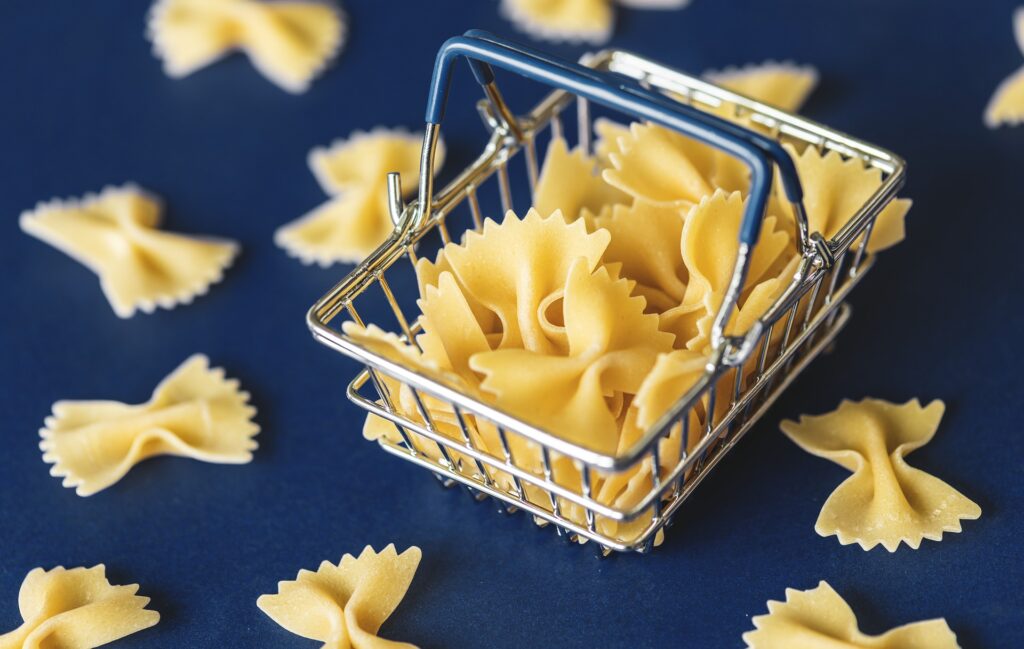Blog, Shopping Baskets
Choosing the Right Size Baskets for What You Sell
Shopping carts and baskets are beneficial for consumers and retailers alike. They help shoppers more easily select several items as they navigate your store, which in turn helps you make more sales. Of course, as you know, not all businesses sell the same things. You might own a grocery store, which provides various perishable and non-perishable food items, while the store next to you might sell a range of electronic items like memory cards, cameras, tablets, and computers. A warehouse club might sell all of these things and more.
When choosing baskets for your store, the size of your products matters just as much as products themselves. In other words, you want to offer your customers shopping baskets that pertain to the shape and size of items you sell so that it’s easy for them to grab as much as they need. This can be difficult if you sell both tiny and enormous products. Anything that’s really big, though, like a television or vacuum cleaner, will require either a large cart or assistance from a staff member.
When it comes to choosing the right size baskets for what you sell, you need to think about everything in your store that could reasonably fit in an average-sized basket. Then, you have to consider things like customer satisfaction, efficiency, and placement. Here we’ll go over all of the key considerations to help you pick the optimal shopping baskets for your store.
What to Know About Proper Shopping Basket Size
Improving the Customer Experience
If you own a business, you know that retaining satisfied customers is vital to growth and longevity. As mentioned above, providing your customers with baskets and carts makes for a better experience and encourages shoppers to pick up more things. It might not be enough, however, to offer a single type of shopping basket, especially if you sell a diverse range of products.
Remember that some of your customers will come in to browse, others will hone in on a specific item or two, and others will pick up an assortment of items. You want to accommodate each of these customer profiles to the best of your ability. This in part means providing unique shopping baskets for these different scenarios.
For instance, customers who don’t need something as large as a cart, but still need a container for a few small items will appreciate the utility of small shopping baskets. These are small and light enough to easily carry around with one arm, but useful for holding a few small or medium-sized items. Another customer might require a larger basket for, say, some boxes of cereal and some milk and eggs. While it may not be possible or optimal to offer a half-dozen types of baskets, simply offering a couple different options can vastly improve the customer experience.
Optimizing by Standardizing
You may not be able to completely satisfy every customer. Still, you want to provide optimal solutions for common situations, like the ones mentioned above. But there are other concerns when it comes to choosing the right size shopping baskets, beyond simply providing multiple options. For some stores, a standard solution might be the most efficient one.
One of the advantages of only offering a single size of shopping basket is that storage is simple and standardized. Customers and employees won’t have to spend time determining where to stack a basket after using it, since each basket is the exact same shape and size. This can greatly save on time and space, as staff members don’t have to waste as much time returning baskets to their proper locations. Standardizing baskets also makes it easier to set up basket stations throughout the store where customers can easily grab a basket or put one back if they decide they don’t need one.
If you decide to invest in only one size of basket, you’ll want to consider a few key things about what you sell, such as:
- What is the average item size sold at the store?
- What is the average item weight sold at the store?
- What are the most popular items sold at the store?
- How many items, on average, does a customer purchase on a given trip?
By collecting this data, you can start to figure out the proper size and shape of your optimal basket. For example, if you sell plenty of long items like umbrellas, baguettes, or rods, you might want to invest in tall baskets for your store. Shopping baskets on wheels are a good alternative to shopping carts if you sell heavier, bulky items. Again, this standard basket you choose won’t please every single customer every time, but it will provide the best possible solution for most cases.
Choose the Right Basket Manufacturer
Every business is different. Depending on what you sell, you might need a variety of big baskets, small baskets, or everything in between. But whether you require a host of different types of baskets or a standardized solution, you want to work with a manufacturer that can provide the right baskets for your unique needs.
Good L Corporation delivers innovative shopping cart and basket solutions for retailers on a global scale. From a fleet of new custom carts to launch your store opening to replacement baskets that supplement your existing shop supply, Good L Corp can configure the right carryall strategy to boost your retail business. Let’s get started! Contact us today for a no-pressure sales quote.


Pingback: Retail Trends: Should You Carry Mini-Carts for Kids? - Good L Corp